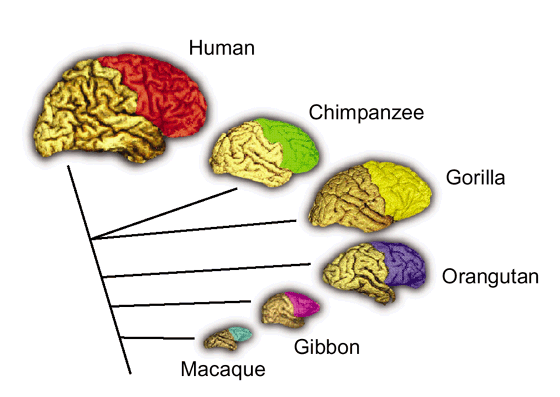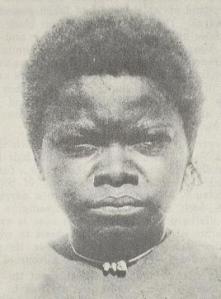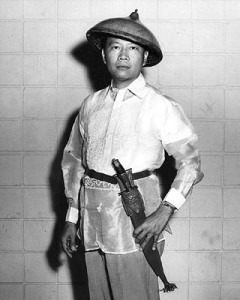If there’s one skill man excels at–beyond every other living creature–it’s problem solving. Nothing stops us from coming up with solutions. No economic system. No political repression. No prison. No paucity of education or any other factor considered critical to thinking. Man transcends any and all mental shackles as though he can’t stop himself. Like an addiction to thinking. A passion for the cerebral. A primal need.
My theory: Man’s big brain is the result not of tool making or upright stature, but our penchant for thinking. Because,  like any muscle in the body, the more we have used our brains, the more they grow, and since the days of Homo habilis–or even Australopithecines–we have used our brains to invent tools, to plan, to communicate. Look at other mammals. When they’re not searching for food, they’re resting or sleeping. Not early man. When he finished hunting, he created tools, gathered food to feed infants and nursing mothers, planned hunts, figured out defenses from predators. All that thinking grew our brain.
like any muscle in the body, the more we have used our brains, the more they grow, and since the days of Homo habilis–or even Australopithecines–we have used our brains to invent tools, to plan, to communicate. Look at other mammals. When they’re not searching for food, they’re resting or sleeping. Not early man. When he finished hunting, he created tools, gathered food to feed infants and nursing mothers, planned hunts, figured out defenses from predators. All that thinking grew our brain.
Today, two million years into the genus Homo‘s arrival, we have another example of our dauntingly brilliant brain. Read on.
by Dan Vergano, USA TODAY
Unraveling the machinery that generates proteins within cells, a discovery that offered new avenues to antibiotics, has earned two Americans and an Israeli the 2009 Nobel Prize in Chemistry.
Venkatraman Ramakrishnan, 57, of the United Kingdom’s MRC Laboratory of Molecular Biology; Thomas Steitz, 69, of Yale; and Israel’s Ada Yonath, 70, of the Weizmann Institute of Science will share the $1.4 million prize equally. Working separately, the trio cracked the chemistry of the “ribosome” inside every cell and showed “how the DNA code is translated into life,” Gunnar Öquist of the Royal Swedish Academy said at Wednesday’s announcement.
“It seemed a bit like climbing Mount Everest. We knew it was doable, in theory. But we didn’t know how to get there,” Steitz said. “When we got it, it was the most exhilarating moment I’ve had in science.”
“Everyone recognized this was on the short list for the prize,” said Jeremy Berg, director of the federal National Institute of General Medical Sciences, part of the National Institutes of Health that funded all three winners for parts of their research. “We’re terribly pleased but not terribly surprised.”
Inside cells, thousands of ribosomes hook up with messenger RNA molecules carrying bits of genetic code. The codes tell ribosomes to spit out proteins, the building blocks of blood, bone, brain and every other tissue. How these machines work had been a mystery without knowing the structure of the ribosome itself.
In 1980, Yonath first reported X-rays of crystallized ribosomes taken from microbes that thrive at high-temperature in the Dead Sea. The images began to reveal the shape of the ribosome. She later showed that freezing crystallized ribosomes also could lead to better X-rays of their structure.
Steitz and Ramakrishnan, a U.S. citizen, tackled higher-resolution X-rays of the small and large halves of the ribosomes, respectively. All three winners produced definitive images of the ribosome’s structure in 2000.
“Proteins are workhorses of the cell. Almost no other process is so fundamental,” Berg said.
Steitz noted the ribosome work led to designs for antibiotics to combat infections such as drug-resistant staph. It also helped researchers understand the evolution of life, where at its core, the ribosome is built of RNA, not proteins, answering questions about how early life produced its own building blocks. An “RNA world” likely existed before microbes moved on to producing DNA and proteins billions of years ago, he suggested.
“Life is chemistry, and I think the award is well-deserved,” said Thomas Lane of the American Chemical Society in Washington, D.C. Yonath is the first woman to win the chemistry Nobel since 1964, he noted, although half of U.S. chemistry degrees now go to women. “I think we’ll see more.”

33.570112
-117.697436









 like any muscle in the body, the more we have used our brains, the more they grow, and since the days of Homo habilis–or even Australopithecines–we have used our brains to invent tools, to plan, to communicate. Look at other mammals. When they’re not searching for food, they’re resting or sleeping. Not early man. When he finished hunting, he created tools, gathered food to feed infants and nursing mothers, planned hunts, figured out defenses from predators. All that thinking grew our brain.
like any muscle in the body, the more we have used our brains, the more they grow, and since the days of Homo habilis–or even Australopithecines–we have used our brains to invent tools, to plan, to communicate. Look at other mammals. When they’re not searching for food, they’re resting or sleeping. Not early man. When he finished hunting, he created tools, gathered food to feed infants and nursing mothers, planned hunts, figured out defenses from predators. All that thinking grew our brain.

















